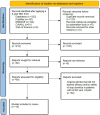A Narrative Review on the Efficacy and Safety of Loop Diuretics in Patients With Heart Failure With Reduced Ejection Fraction and Preserved Ejection Fraction
- PMID: 37872937
- PMCID: PMC10590658
- DOI: 10.7759/cureus.45794
A Narrative Review on the Efficacy and Safety of Loop Diuretics in Patients With Heart Failure With Reduced Ejection Fraction and Preserved Ejection Fraction
Abstract
To date, loop diuretics are the mainstay treatment for decongestion in patients with acute decompensated heart failure (HF). In clinical practice, loop diuretics have also been utilized for patients with chronic HF with reduced and preserved ejection fractions. There is a paucity of quality evidence of the effect of loop diuretics use and dosing on clinical outcomes in HF patients beyond symptomatic relief. In this review, we aimed to summarize recently published data on the use of loop diuretics in patients with HF, focusing on efficacy and safety outcomes in patients with HF with reduced and preserved ejection fraction. We searched EMBASE, PubMed, CINAHL, and the "Web of Science" databases. Cohort studies and randomized controlled trials published after 2018 and written in English were included in this review. Case reports, case series, cross-sectional studies, review articles, commentaries, articles published more than five years ago, and studies involving children were excluded. Results were divided into the efficacy and safety of loop diuretics in HF with reduced ejection fraction (HFrEF) and HF with preserved ejection fraction (HFpEF). A registry-based study included in our review observed a reduced 30-day all-cause mortality in patients with HFrEF receiving loop diuretics compared to those not receiving loop diuretics (HR=0.73; 95% CI=0.57-0.94; p=0.016), but there was no statistically significant association at the 60-day follow-up of the same group of patients. Most studies reviewed showed that the choice of loop diuretics did not influence clinical outcomes such as mortality and HF rehospitalization in patients with HF with reduced and preserved ejection fraction despite differences in oral bioavailability and half-life. Studies have consistently shown that patients with HF who receive a higher dose of loop diuretics are likely to experience a decline in renal function and hypotension, regardless of their type of HF. Discontinuation or reduction of the dose of loop diuretics should be considered in patients with HF after decongestion.
Keywords: efficacy; hfpef; hfref; loop diuretics; safety.
Copyright © 2023, Pius et al.
Conflict of interest statement
The authors have declared that no competing interests exist.
Figures
References
-
- 2022 AHA/ACC/HFSA guideline for the management of heart failure: a report of the American College of Cardiology/American Heart Association Joint Committee on clinical practice guidelines. Heidenreich PA, Bozkurt B, Aguilar D, et al. Circulation. 2022;145:0. - PubMed
-
- Heart disease and Stroke Statistics-2020 update: a report from the American Heart Association. Virani SS, Alonso A, Benjamin EJ, et al. Circulation. 2020;141:0–596. - PubMed
Publication types
LinkOut - more resources
Full Text Sources
Research Materials
Miscellaneous

